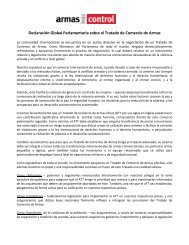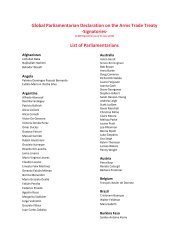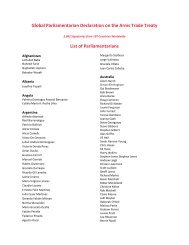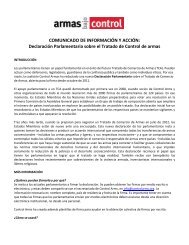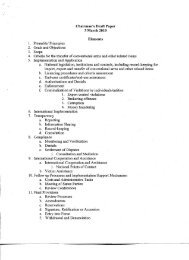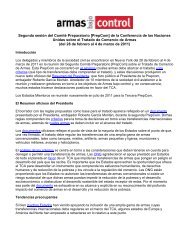Making it Work - Control Arms
Making it Work - Control Arms
Making it Work - Control Arms
- No tags were found...
Create successful ePaper yourself
Turn your PDF publications into a flip-book with our unique Google optimized e-Paper software.
SAFERWORLD 9ConclusionIn order for an ATT to function effectively, reporting provisions should include detailsof international arms transfers conducted by states parties during a given period, stepstaken to implement the treaty at national level and details of capac<strong>it</strong>y-building assistanceprovided and received. In add<strong>it</strong>ion, the consideration of reporting requirementsshould take account of the following:■ The exact nature and modal<strong>it</strong>ies of reporting under an ATT should be agreed by statesparties at the earliest opportun<strong>it</strong>y and included in an Annex to the Treaty; reportingtemplates should be developed, although these should be flexible enough to allow forfurther improvements to the reporting system in the future.■ A Treaty inst<strong>it</strong>ution (such as an ATT Secretariat, see section 4.1 below) should betasked w<strong>it</strong>h reviewing the data on international arms transfers that is provided bystates so as to facil<strong>it</strong>ate mon<strong>it</strong>oring of compliance and to build confidence in theeffective functioning of an ATT.■ An ATT should include clear comm<strong>it</strong>ments relating to the provision of nationalreports on international arms transfers; such reports should reflect the full extent ofthe comm<strong>it</strong>ments enshrined w<strong>it</strong>hin the Treaty.■ As a non-discriminatory regime, an ATT should require the exchange of informationby all states parties on their international arms transfers to all recipients (i.e. to endusersin all states, regardless of whether they are party to an ATT).■ Sufficient information should be provided so as to allow accurate assessment ofinternational arms transfers, possibly through disclosure of transfers according toMil<strong>it</strong>ary List sub-categories.■ States parties to an ATT should report on their international arms transfers on anannual basis.■ States parties should include in their reports information on steps taken toimplement an ATT at national level including legislative developments, administrativeimprovements, increases in capac<strong>it</strong>y for enforcement and relevant advances ininformation technology.■ States parties should report on assistance that has been provided or received w<strong>it</strong>h theaim of building capac<strong>it</strong>y for implementation of an ATT at national level.3.2 Informationexchangebetween statespartiesBeyond the reporting requirements discussed above, <strong>it</strong> is possible to envisage a rangeof information exchanges that could take place under an ATT and that may help statesparties meet their Treaty obligations and build confidence in the effectiveness of theregime.3.2.1 DenialnotificationOne of the most often-repeated arguments against the efficacy of multilateral armstransfer controls is that “if we don’t sell [A or B <strong>it</strong>em to X or Y recipient] someone elsewill”, an argument that, when taken to <strong>it</strong>s logical conclusion, has the effect of reducinglevels of restraint to the lowest common denominator. Countering this premise will bea key part of efforts to build confidence in an ATT as an effective regime. Thenotification of denials of international arms transfer licences, when coupled w<strong>it</strong>h theobservance of an implic<strong>it</strong> or explic<strong>it</strong> no-undercutting rule (i.e. states comm<strong>it</strong> to notauthorise an arms transfer when a similar request has already been refused by anotherstate), could const<strong>it</strong>ute an important mechanism in maintaining levels of restraint.Indeed, the desirabil<strong>it</strong>y of states parties reporting on international arms transferdenials was raised by a number of states in their submissions to the UN SecretaryGeneral. 1616 The Global <strong>Arms</strong> Trade Treaty: What States Want p 37.



